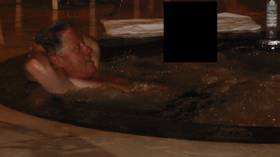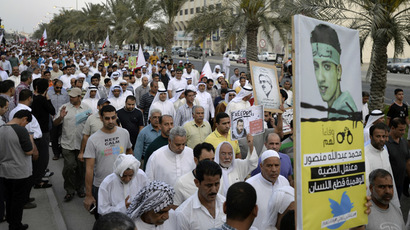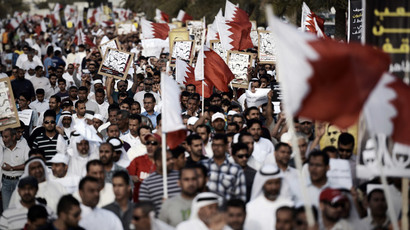Released activist Nabeel Rajab vows to continue fight for human rights (EXCLUSIVE)
In his first interview since being released from prison, Bahraini human rights activist Nabeel Rajab told RT that he will continue his fight for democracy. He was locked up for tweeting remarks that were deemed to be insulting to Bahraini institutions.
READ MORE: Bahrain detains, questions human rights activist Nabeel Rajab
A court in Manama ordered Rajab’s release but barred him from
leaving the country. His next hearing will be on January 20.
Rajab is the director of the Bahrain Center for Human Rights, and
was freed in May after serving two years for taking part in
unauthorized protests.
Rajab is a member of Bahrain’s Shia majority, which has been
protesting against the country's Sunni ruling monarchy since
February 2011.
RT:How does it feel to be released?
Nabeel Rajab: I’m happy to talk to you as the
first TV interview I’ve done since being released. The first
interview I did after my release in May was with Russia Today,
and today after my release [it's] the first TV interview I’ve
done.
I feel good that I’m out after being inside for a month for a
tweet I made, and that was because Bahrain has a policy of
targeting human rights activists, as you know. As I’m talking to
you, there are thousands other than me behind bars. Many of them
are human rights activists who have been charged with terrorism,
and many activists are out of the country. Human rights activists
in this country are the target of the government and intuitions.
We are forced to be silent. We are to be suffocated because the
government doesn’t want us to talk, doesn’t want us to criticize
government institutions, which have been responsible for a lot of
human rights violations. And today I’m paying the price for
talking; I’m paying the price for what I write, for monitoring
the human rights violations in this country. So what I am facing
is what hundreds of other human rights activists face. Many
people are behind bars today [in Bahrain] because of a tweet they
have made or because of criticism they have written in a
newspaper or online. Thank God I’m more known than others, but
unfortunately those people, nobody knows about them. And I urge
the international community to look into human rights violations
in this country and leave their interest on one side, but respect
the human rights, the justice that they’ve fought for many years.
A lot of human rights violations are happening in this part of
the world and we hardly hear about it internationally.
RT:What about your situation now?
Presumably now that you’ve been released from prison, you’ll
continue your campaign for human rights. Or do you fear that you
will be imprisoned again? Does that concern you?
NR: There is no bargaining about my work for
human rights. The struggle has to continue for justice and
democracy. You can’t get justice and democracy free of charge. We
have been ruled by the same family for the past 200 years in the
same way. Now we are struggling to have democracy, justice,
equality, and liberty. We have seen it in Europe and around the
world, but we haven’t tasted it. We need to have the same
democratic system in my country. I know that it’s very costly and
that a lot of people have given their lives. So me comparing to
them is nothing. I spent my last two years in jail and now again
I’m spending one month. And I was released on bail and I don’t
know for how long I’m going to be out. But whatever happens, it’s
not going to stop me from continuing my struggle for democracy.
I’m more determined. I’m more sure that the struggle has to
continue peacefully to achieve human rights and democracy.
RT:What was your time like in prison over
the last couple of months?
NR: Over the past two years and the past one
month also, I was always among the 4,000 political prisoners. I
was always kept in isolation. I was not allowed to mix with other
political prisoners, although all political prisoners keep
together, but I was the only one. [They see] that I’m creating
awareness of human rights and see that as dangerous, as a threat,
so they always keep me in isolation. They kept me in a jail away
from other political prisoners, mostly with foreigners and
migrant workers who were there for a few hours or one or two
days. But I was always in isolation for the past two years and
the past one month also.














